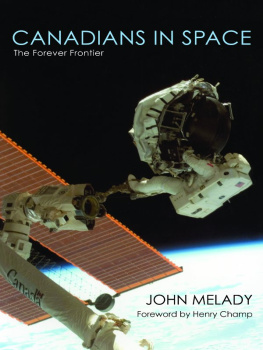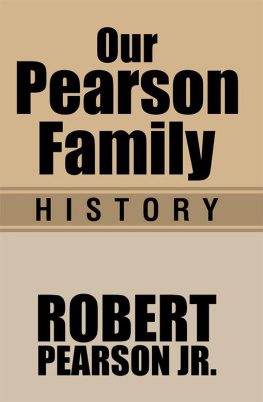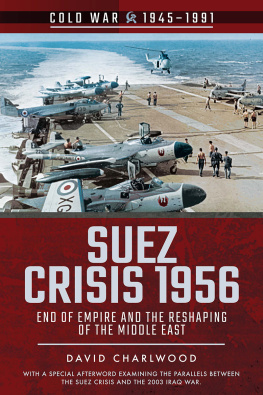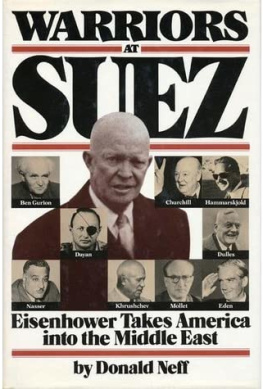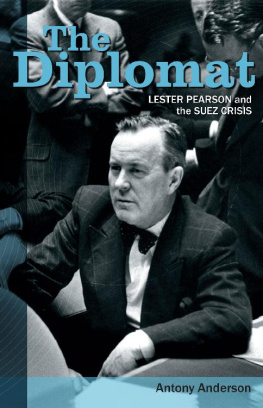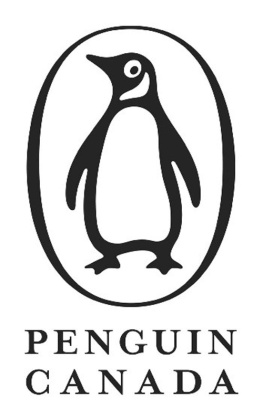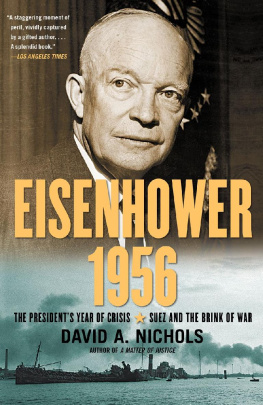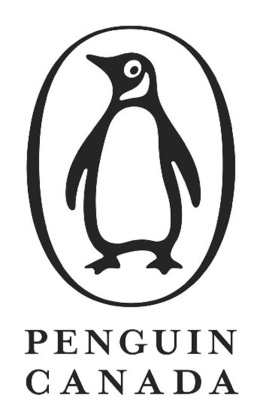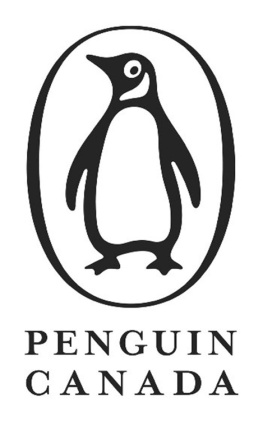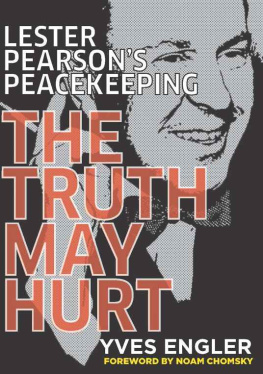Pearsons Prize
Other Books by John Melady
Acts of Courage
Cross of Valour
Explosion
Escape from Canada!
Heartbreak and Heroism
Korea: Canadas Forgotten War
The Little Princes
Overtime Overdue: The Bill Barilko Story
Pilots
Search and Rescue
Star of Courage
Double Trap
PEARSONS PRIZE
Canada and the Suez Crisis
John Melady
Copyright John Melady, 2006
All rights reserved. No part of this publication may be reproduced, stored in a retrieval system, or transmitted in any form or by any means, electronic, mechanical, photocopying, recording, or otherwise (except for brief passages for purposes of review) without the prior permission of Dundurn Press. Permission to photocopy should be requested from Access Copyright.
Copy-editor: Andrea Waters
Design: Alison Carr
Printer: TRI-GRAPHIC Printing Limited
Library and Archives Canada Cataloguing in Publication
Melady, John
Pearsons prize : Canada and the Suez crisis / John Melady.
Includes bibliographical references and index.
ISBN 10: 1-55002-611-9
ISBN 13: 978-1-55002-611-5
1. Pearson, Lester B., 1897-1972. 2. Suez Canal (Egypt)--History.
3. Egypt--History--Intervention, 1956. 4. United Nations Emergency Force.
5. Canada--Foreign relations--1945-. I. Title.
FC621.P4M45 2006 962.053092 C2006-902682-3
1 2 3 4 5 10 09 08 07 06
We acknowledge the support of the Canada Council for the Arts and the Ontario Arts Council for our publishing program. We also acknowledge the financial support of the Government of Canada through the Book Publishing Industry Development Program and The Association for the Export of Canadian Books, and the Government of Ontario through the Ontario Book Publishers Tax Credit program and the Ontario Media Development Corporation.
Care has been taken to trace the ownership of copyright material used in this book. The author and the publisher welcome any information enabling them to rectify any references or credits in subsequent editions.
J. Kirk Howard, President
Printed and bound in Canada
Printed on recycled paper
www.dundurn.com
Dundurn Press
3 Church Street, Suite 500
Toronto, Ontario, Canada
M5E 1M2
Gazelle Book Services Limited
White Cross Mills
High Town, Lancaster, England
LA1 4XS
Dundurn Press
2250 Military Road
Tonawanda, NY
U.S.A. 14150
In memory of John C. Garrett
Educator, mentor, friend
CONTENTS
ACKNOWLEDGEMENTS
I WAS A UNIVERSITY STUDENT when the Suez Crisis took place. Perhaps for that reason as much as any other, the seriousness of the event had a special impact on me, as it did on my classmates. All of us were of draft age, so none of us knew if we were going to be conscripted to fight Englands fight. After all, in the wars of the past, that was what had happened.
Fortunately, the matter was resolved, and while nuclear weapons were armed and ready, none were used. The world relaxed, and one man from one nation was singled out as the person who did more than anyone else to resolve the problem. That was why Lester Pearson was awarded the Nobel Prize for Peace. I was thankful to Pearson, and I decided that someday, I would write about what he had done to save the world from war. However, I never dreamed that the gestation time for this account would be fifty years.
But even after all that time, I still needed the help, wise counsel, and the suggestions of many before the manuscript became a reality. At this time, I would like to thank them. First of all, Kirk Howard, my publisher, who offered his advice, direction, and resources in deciding to publish these words. I am also grateful to so many others who assisted me at Dundurn. Among them are Beth Bruder, Tony Hawke, Barry Jowett, Ali Pennels, Andrew Roberts, Jennifer Scott, and especially Andrea Waters, who has read every word of the text, edited it, and made my efforts as presentable as she could.
As they have been in the past, librarians Jeanette Finnigan and Reg Thompson were again very helpful. So were many others at the Central Reference Library in Toronto, as well as Rodney Travers-Griffin and Bill McMaster in the same city. Goderich, Ontario, bookstore owner Tom Fincher gave me excellent advice and marketing suggestions. So did several individuals in Ottawa, particularly those who assisted me at Foreign Affairs Canada and at Laurier House.
In Britain, the staff at the Imperial War Museum were of help, as were the knowledgeable personnel that I dealt with in Egypt, particularly at Port Said and Cairo. Unfortunately, I no longer know your names, but I was impressed by your breadth of information and your ability to impart it.
In New York, Michael Kovrig at Dag Hammarskjld Place was generous with his time, assistance, and direction. Shadrack Mbogho showed me around both the Security Council and the General Assembly at the United Nations and patiently answered every question I asked in both places. At the UN as well, Veena Manchanda was of great assistance in the search for the photographs that I needed.
Closer to home, Dan McMillan and Carolyn Parks gave me both direction and the benefit of their advice. In London, Ontario, Elaine Ruttan and Mike Dobson helped in the photo editing and cropping. Joe Vick saved my neck when my computer hard drive died, while John Snell listened to my complaints about deadlines and writing-related difficulties but never showed annoyance.
And lastly, but most important of all, my wife, Mary, who was always encouraging and supportive of the project. The fact that she also admired Lester Pearson was an additional bonus.
John Melady
Seaforth, Ontario
May 2006
INTRODUCTION
OVER THE YEARS, I have been lucky enough to have met, talked with, or shaken the hands of several of our prime ministers. In fact, I have even played golf with one of the more recent residents of 24 Sussex Drive. And even though such contacts were often fleeting, each of these men left an impression on me. While I might not have voted for all of them, I respected all of them. I respected them because through their own initiative and deep-seated drive, they had reached the pinnacle of political success in this nation. They all held the most powerful, most important, and at times, I suppose, most frustrating job imaginable. Not all were successful. In fact, one or two were washouts as prime minister. On the other hand, I know that even they did the best they could with the talents they had. For that reason, I thank them for trying.
Yet of all these leaders, one stood out for me before I met him, when I met him, and since I met him. In fact, Lester Pearson was, to me at least, one of the finest prime ministers we have ever had. With his self-effacing, modest demeanour, his finely tuned negotiating skills, his clarity of vision, and his integral honesty, he brought humanity and honour to the top job in the land.
I met Pearson only once. It was during an election campaign, and because of a scheduling fluke, he had arrived some fifteen minutes early for a speech. His handlers seemed quite frustrated by the problem and at a loss as to how to use the extra time. Because I had hoped to meet the prime minister anyway, I happened to be standing nearby when a local official who knew me called me over. He introduced me to our distinguished visitor and then disappeared. I was obviously nervous and not sure what I should say, but Pearson noticed my discomfort and immediately put me at ease. He asked me what I did, where I worked, and what I thought of the partys prospects in the local campaign. Then I mentioned the United Nations and his time with the organization.


